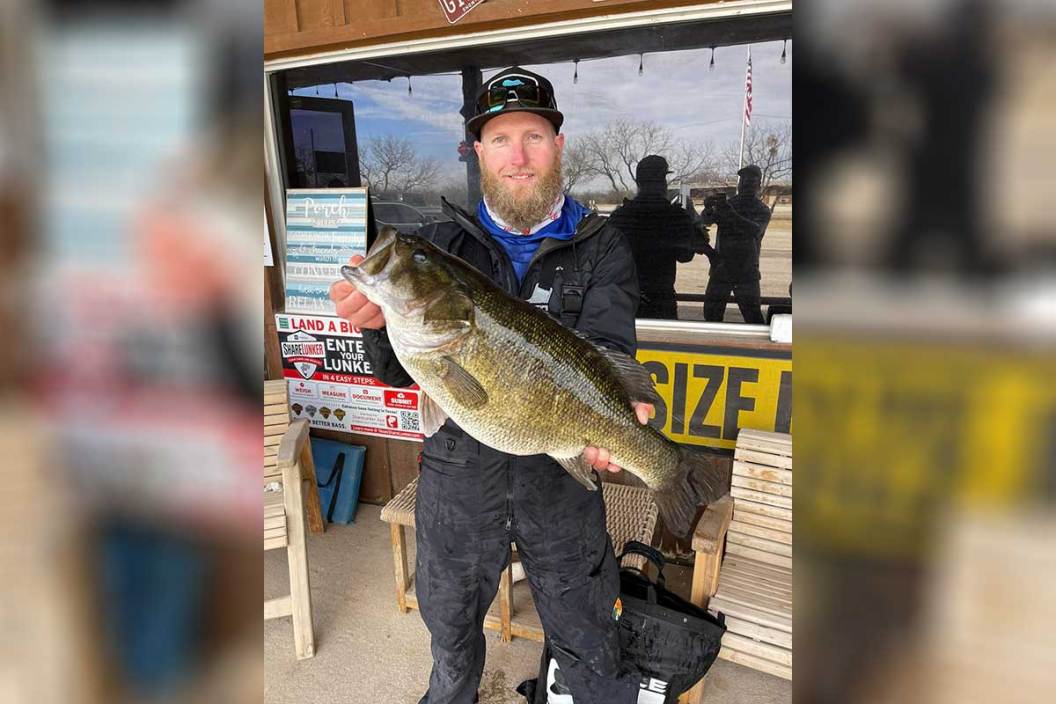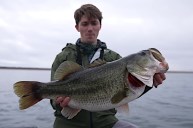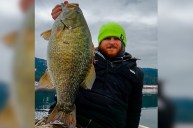We got in touch with the man who caught what should end up as the new world record meanmouth. Here's his story of the exciting catch.
Brady Stanford is developing a reputation for catching big fish in Texas. His latest accomplishment might get his name, and the largemouth/smallmouth hybrid bass he caught, in the world record books.
While fishing the O.H. Ivie Reservoir on February 22, 2022, Stanford reeled in and landed an 11.07-pound meanmouth, which measured 24 3/4 inches long with a girth of 20.5 inches. Once genetically verified and approved by the IGFA, it should surpass the current world record 7.6-pound meanmouth, which was caught about a year prior in the same reservoir by Wyatt Frankens.
Here's footage, from cast to catch, that Stanford shared on his Facebook page.
We got in touch with Stanford, who was generous enough to share some more of the details.
"I was fishing a flat between a bend in the channel just expanding on a spot I had caught some good fish on the week before," the angler said. He mentioned he was using a 7'6" Mag-medium heavy swimbait rod with a 5.5:1 reel.
The potential record fish was caught using a 3.8-inch swimbait on a 1/4-ounce jig head on 18-pound fluorocarbon line. Stanford said the fish was in about 18 feet of water and he was using live sonar.
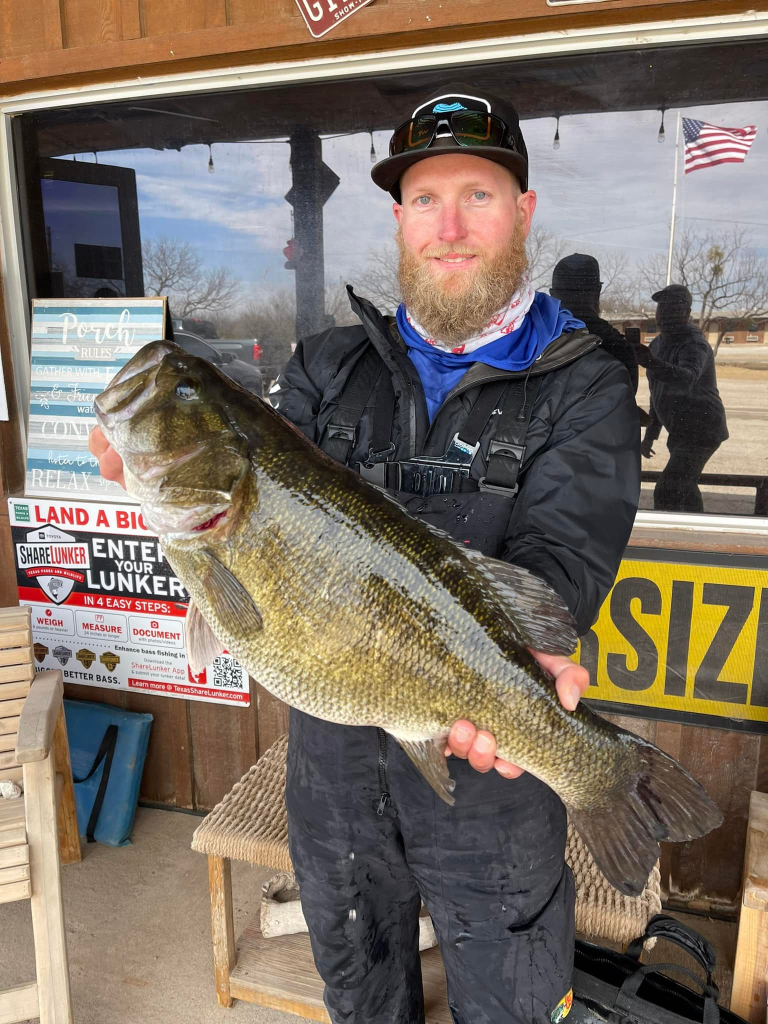
Brady Stanford
Since meanmouth are a lesser-known hybrid species, we had to ask if Stanford was targeting them or if he caught it unintentionally.
"No, I wasn't intentionally targeting them because you really can't," he said. "There are areas of the lake where smallmouth are more prevalent but where I caught [this fish] isn't really where you would catch any smallmouth, so I definitely wouldn't have expected to find a hybrid there.
"Once I got the fish in the net I could tell it was a meanmouth, that was the "Holy s***" moment in my video. It was just obvious to me that it wasn't like all the largemouth I have been catching there, and it was too big to be a smallmouth."
We also inquired about the weighing and measuring process, which Stanford filled us in on.
"As soon as I caught it and put her in the livewell, I called my dad first to tell him," said Stanford. "Then the next call I made was to [the] Texas Parks and Wildlife ShareLunker Program to find out what all needed to be done so I could collect a sample for genetic testing. They sent some of their local staff to meet me at the marina so they could collect the sample and transport it to get tested. Then I contacted Concho Park Marina and let them know I was bringing in a fish to weigh.
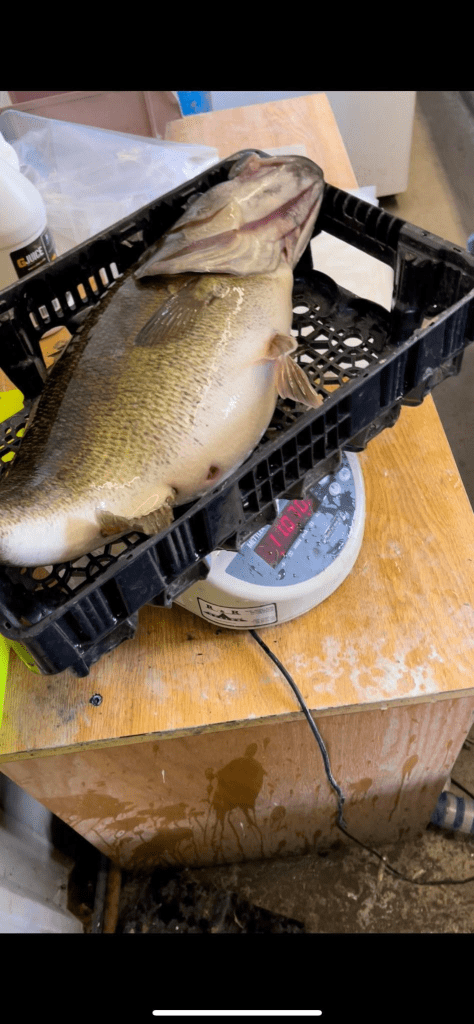
Brady Stanford
"After that I drove back to Concho Park where I put the boat in, less than a five-minute drive, and I pulled the boat out and drove up to the marina where the people there were waiting on me. I went in and made sure the official scale was ready, then went back and got a tournament bag and put some water from the livewell in it and had a guy at the marina help hold the bag while I got her out of the livewell and put her in the bag.
"We took her in and weighed her and got a length measurement, then put her back in the bag and went outside and got some pictures. Then I put her in one of the tanks at the marina while we waited for TPWD to show up. They showed up within an hour of me catching her, [and] once they got there we pulled her out of the tank for an official length and girth measurement. They also collected the sample for genetic testing at this time by clipping a small piece of the pectoral fin. Then we took her in the bag back out by my boat to get some additional pictures in the sun of the mouth and the dorsal fin for TPWD. Once that was all done I put her back in the livewell and took her back out where I caught her and released her. The whole process from catching her to when I released her was less than two hours," Stanford said.
And of course, we wanted to know what Stanford planned to do to memorialize the fish.
"I plan on having a replica made from the photos and measurements," he said.
Stanford also helped explain a bit of the ShareLunker process, and whether or not this fish would be eligible for its breeding program.
"The Texas Parks and Wildlife ShareLunker Program only accepts fish over 13 pounds to be sent to Athens for breeding, [which is] known as the Legacy Class," he said. "I submitted a 15.03-pound [bass] to them in January which will be part of the breeding program. This fish would qualify as an Elite Class, which is from 10 to 13 pounds, and I will submit photos through the TPWD ShareLunker app to get the Elite recognition."
Since he had previous contact with the folks running the ShareLunker Program, Stanford knew they were a stand up group and would be helpful during the whole ordeal.
"I contacted them because I knew they would handle the genetic testing and they have a transport crew that is local that would come and get the sample at the lake and have it sent for testing," he said. "The ShareLunker Program in Texas is a great service and they make it very convenient to have your fish transported to the hatchery, or in this case come and get a genetic sample for testing. The people there are very helpful and friendly. I'm am very thankful to have a service like this in Texas because I have never had to take a genetic sample from a fish and did not have a clue about what all I needed to do."
Stanford, a regular on O.H. Ivie and no stranger to big catches, had high hopes for what's still to come for the meanmouth hybrid species.
"It will be interesting in the future to see what they will do once a 13-pound or over meanmouth is caught," he said. "I believe it will just be a matter of time before it happens, I just hope it's not too soon."
This is one of the more interesting catches we've reported on in recent memory, and Stanford deserves recognition and congratulations for not just catching this giant meanmouth, but for releasing it less than two hours later in the same spot. It might not be the last time we hear his name, and we're thankful for his insight and responses to our questions.
We'll keep an eye on the pending world record verification from the IGFA and report on it when news comes out.
NEXT: 5 BEST WEEDLESS LURES FOR BASS FISHING IN THE THICK STUFF
